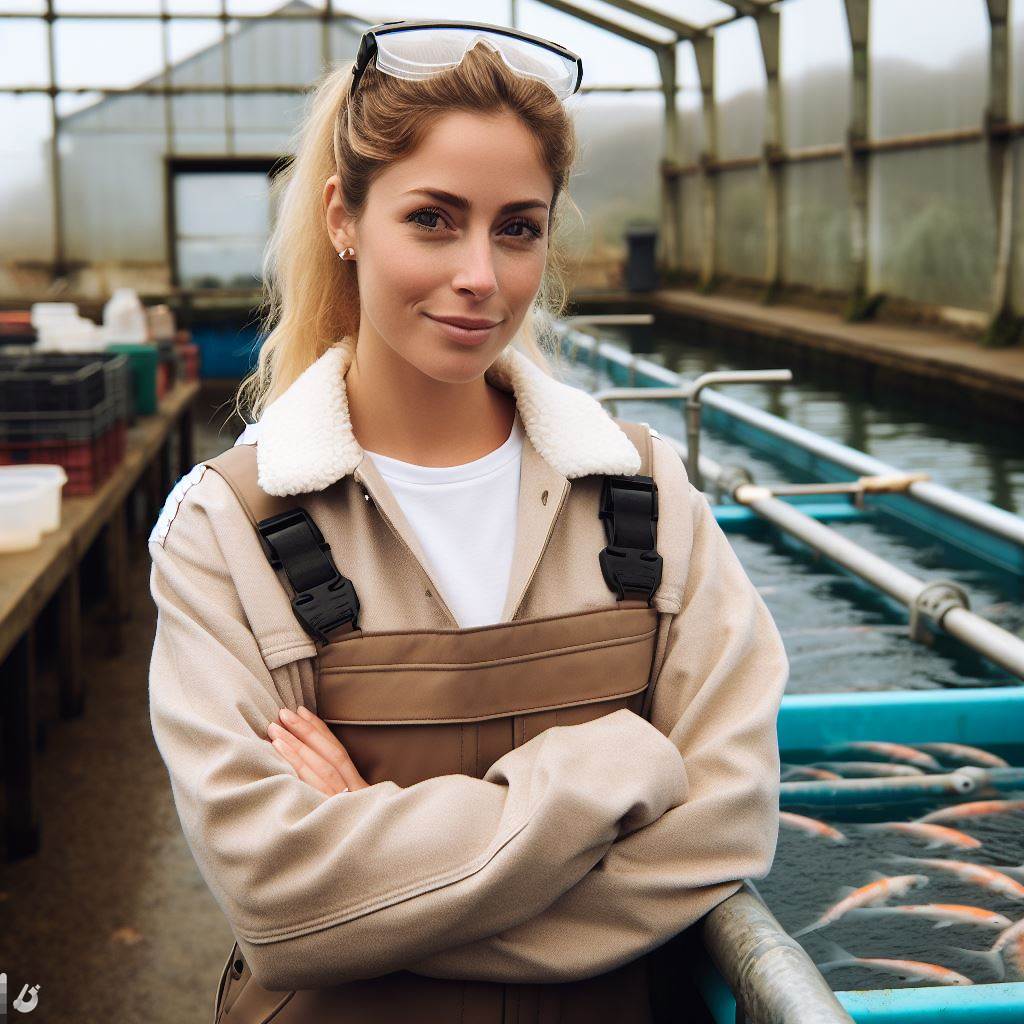Introduction
Climate Change and UK Farming
The specter of climate change looms large over UK farming, presenting a multifaceted challenge that extends beyond the meteorological realm.
As temperatures fluctuate, precipitation patterns shift, and extreme weather events become more frequent, the very fabric of traditional farming practices is unraveling.
Farmers find themselves grappling with the unpredictable consequences of a changing climate, ranging from altered crop yields to the emergence of new pests and diseases.
Importance of Adapting Strategies
Amid this uncertainty, the importance of adapting strategies cannot be overstated. It is no longer a theoretical consideration but a practical necessity.
Adapting strategies is the linchpin for mitigating the adverse effects of climate change on agriculture, ensuring the long-term viability of the sector.
Embrace innovative techniques, cultivate resilient crops, and adopt sustainable practices, buffering against climate challenges.
This ensures a robust, resilient farming future in the United Kingdom.
Overview of climate change and its impact on UK farming
Climate change and its causes
Climate change refers to long-term shifts in weather patterns caused by human activities, primarily the emission of greenhouse gases such as carbon dioxide.
These gases trap heat in the atmosphere, leading to a rise in global temperatures.
The specific effects of climate change on agriculture in the UK
Changes in temperature and precipitation patterns
Climate change is leading to unpredictable weather patterns in the UK, with increases in both temperature and precipitation. This affects crop growth, irrigation needs, and overall farming practices.
Increased frequency of extreme weather events
The UK is experiencing a rise in extreme weather events, such as intense rainfall, storms, and heatwaves.
These events damage crops, livestock, and agricultural infrastructure, causing financial losses for farmers.
Rising sea levels and potential coastal flooding
As a result of climate change, sea levels are rising globally. This poses a significant threat to low-lying coastal areas in the UK, where agriculture plays a vital role.
Coastal flooding can result in soil erosion, rendering farmland unusable.
Shifts in the distribution of pests and diseases
Climate change affects the behavior and distribution of pests and diseases, impacting UK agriculture.
Warmer temperatures can allow new pests to thrive and increase the prevalence of diseases, affecting crop yields and livestock health.
Climate change poses significant challenges for UK farming. The need to adapt strategies and practices becomes crucial to mitigate its negative impacts on the agricultural sector.
Read: Aquaculture Equipment Essentials in the UK
The need for adapting strategies in UK farming
The importance of adapting farming practices to ensure the viability of the sector
- Climate change poses significant threats to the agricultural industry in the UK.
- Without adaptation, farms may struggle to produce enough food to meet demand.
- Adapting farming practices is crucial to ensure the viability and sustainability of the sector.
- By adjusting strategies, farmers can mitigate the negative effects of climate change.
- Adapting practices allows farmers to better cope with the changing climate and its challenges.
The potential risks and challenges faced by farmers due to climate change
- Rising temperatures could negatively impact crop growth and agriculture yields.
- Extreme weather events such as floods or droughts can damage crops and infrastructure.
- Changing rainfall patterns may disrupt planting and harvesting schedules.
- Pests and diseases could become more prevalent due to the changing climate.
- Inability to adapt may lead to decreased productivity and financial losses for farmers.
The benefits of adapting strategies in terms of enhancing resilience and sustainability in farming
- Adapting strategies allows farmers to build resilience against climate change impacts.
- Implementation of new techniques and technologies can increase efficiency in resource use.
- Adaptation measures can help preserve soil health and reduce erosion risks.
- Efficient water management techniques can alleviate the impact of changing rainfall patterns.
- Adapting strategies can enhance the long-term sustainability of farming and food production.
Most importantly, the need for adapting strategies in UK farming is paramount to ensure the sector’s viability, given the challenges posed by climate change.
Adapting farming practices mitigates potential risks, such as crop damage, productivity losses, and resource inefficiency.
By embracing adaptation measures, farmers can build resilience, preserve soil health, and manage water resources effectively.
Ultimately, adapting strategies in farming enhances long-term sustainability and secures a resilient future for UK agriculture.
Read: Aquatic Health Management by UK Experts
Adaptive strategies for UK farmers
As climate change continues to impact UK agriculture, farmers are increasingly adopting adaptive strategies to minimize risks and ensure sustainable productivity.
This section explores some of the key strategies being implemented by UK farmers.
Crop diversification
- Exploring new crop varieties that are more resilient to changing conditions.
- Adopting mixed cropping systems to minimize risks and increase productivity.
Farmers are exploring new crop varieties that exhibit greater resilience to changing environmental conditions.
By diversifying their crop portfolio, they can mitigate the risks associated with climate change-induced uncertainties.
Additionally, adopting mixed cropping systems, which involve growing multiple crops together, helps improve soil health and increase overall productivity.
Personalized UK Career Consulting
Receive tailored career guidance designed just for you. Get actionable steps and expert support to boost your career in 1-3 days. Take control of your career now.
Get StartedImproved water management
- Implementing efficient irrigation techniques to conserve water resources.
- Investing in water storage and rainwater harvesting systems.
Efficient water management is crucial for sustainable farming in the face of climate change.
Farmers are implementing irrigation techniques that minimize water wastage and conserve this valuable resource.
Investing in water storage and rainwater harvesting systems further enhances their ability to secure water supply during periods of scarcity, ensuring continuous crop growth.
Precision agriculture and technology integration
- Utilizing advanced technologies and data-driven approaches for better farm management.
- Incorporating remote sensing and predictive models to optimize resource allocation.
The integration of advanced technologies and data-driven approaches is transforming farm management practices.
Precision agriculture techniques enable farmers to monitor and analyze various factors like soil moisture, nutrient levels, and pest infestations in real-time.
This invaluable data helps optimize resource allocation, resulting in improved productivity, reduced costs, and minimized environmental impact.
Remote sensing and predictive models also play a vital role in optimizing farming operations.
By utilizing satellite imagery and climate data, farmers can identify areas of potential risk or opportunity, allowing for more informed decision-making.
These technologies enable them to adjust farming practices accordingly, maximizing yields and minimizing resource wastage.
Sustainable land management
- Implementing soil conservation practices to enhance soil quality and fertility.
- Promoting agroforestry and carbon sequestration to reduce greenhouse gas emissions.
To mitigate the adverse effects of climate change, farmers are implementing sustainable land management practices.
Soil conservation measures, such as reduced tillage and cover cropping, help enhance soil quality and fertility.
Maintaining healthy soils enables crops to better withstand the impacts of extreme weather events and ensures long-term productivity.
In addition to soil conservation, promoting agroforestry practices contributes to climate change mitigation. Trees play a crucial role in carbon sequestration, removing greenhouse gases from the atmosphere.
By integrating trees into agricultural landscapes, farmers can reduce their carbon footprint and contribute to the overall climate resilience of their farms.
In essence, UK farmers are actively adapting their strategies in response to climate change challenges.
By diversifying crops, improving water management, integrating advanced technologies, and implementing sustainable land management practices.
Farmers are working towards a more resilient and sustainable agricultural sector in the face of a changing climate.
These adaptive strategies not only protect their livelihoods but also contribute to the overall mitigation of climate change impacts on the environment.
Read: Aquaculture Law: UK Regulations Explained

Learn More: UK Farming: Challenges and Rewards Explained
Government support and initiatives
The role of government in promoting and supporting adaptation strategies in UK farming
- The government plays a crucial role in encouraging farmers to adapt to climate change.
- It provides policy frameworks, financial incentives, and technical support to facilitate adaptation efforts.
- The government’s role is to create an enabling environment that helps farmers overcome barriers.
- Through targeted interventions and regulations, the government ensures that farming practices align with sustainable goals.
- It collaborates with research institutions to generate scientific evidence on adaptation strategies.
- The government encourages knowledge sharing and dissemination to enhance the uptake of best practices.
- By promoting innovation and efficiency, it helps farmers become resilient to climate challenges.
- Government initiatives also aim to improve farm management, resource use, and productivity.
- Partnerships between the government, farmers, and industry stakeholders foster a collective approach to adaptation.
- Through effective policies and programs, the government helps drive the transition towards sustainable agriculture.
Specific policies, grants, and funding opportunities available to farmers
- The UK government offers various financial support schemes specifically designed for farmers.
- The Countryside Stewardship Scheme assists in implementing land management practices that enhance resilience.
- Farmers can access grants for investing in sustainable infrastructure and equipment.
- The Environmental Land Management scheme provides funding for environmental enhancements and sustainable practices.
- The Farming Recovery Fund supports farmers in recovering from extreme weather events.
- The Rural Development Programme for England offers grants to improve farm productivity and diversify income streams.
- Income support schemes, such as the Basic Payment Scheme, assist farmers during the transition to new agricultural practices.
- Training and knowledge exchange programs receive funding to equip farmers with necessary skills and information.
- Government-backed insurance schemes help farmers mitigate financial risks associated with climate change impacts.
- Farmers can avail themselves of tax incentives for adopting climate-friendly practices and investing in renewable energy.
Examples of successful initiatives and case studies
- The Farming Futures program led by the Department for Environment, Food and Rural Affairs (DEFRA) has supported successful adaptation projects.
- One case study from Devon showcases a farmer who diversified his crops to adapt to changing weather conditions and market demands.
- Agricultural organizations, like the National Farmers’ Union, play a vital role in promoting and facilitating adaptation initiatives.
- The Innovation for Agriculture program has enabled farmers to adopt innovative technologies for improved climate resilience.
- A project in Norfolk demonstrated the benefits of precision farming techniques in optimizing resource use and reducing emissions.
- The Catchment Sensitive Farming initiative has helped farmers in vulnerable areas adopt practices that protect water quality.
- Collaborative projects involving farmers, researchers, and policymakers have resulted in the successful implementation of climate-smart agriculture.
- Through targeted knowledge transfer programs, farmers have been empowered to adopt adaptive strategies and share their experiences.
- The government’s financial support has enabled farmers to invest in renewable energy systems, reducing greenhouse gas emissions.
- Successful initiatives have showcased how adaptation strategies can improve farm sustainability, profitability, and environmental stewardship.
By actively supporting and promoting adaptation strategies, the UK government plays a crucial role in ensuring the long-term resilience and sustainability of the country’s agricultural sector.
Read: UK Aquaculture Technician: Career FAQs
Conclusion
It is vital for UK farming to adapt strategies to tackle the challenges posed by climate change. By doing so, farmers can ensure the sustainability and productivity of their operations.
Furthermore, it is crucial for farmers to embrace sustainable practices, such as organic farming, crop rotation, and conservation agriculture, to minimize their environmental impact.
Additionally, leveraging available support and resources, such as government initiatives and funding for climate resilience, can further enhance the ability of farmers to adapt to changing climatic conditions.
Despite the challenges, there is optimism about the future of UK farming with effective adaptation strategies in place.
By implementing innovative techniques, utilizing technology, and collaborating with experts and researchers, farmers can overcome the obstacles posed by climate change and continue to thrive.
Your Dream Job Starts with a Perfect CV
Get a tailored CV and cover letter that captures your unique strengths and stands out in your industry. Let us help you make an unforgettable first impression.
Get Started[E-Book for Sale]
500 Cutting-Edge Tech Startup Ideas for 2024 & 2025: Innovate, Create, Dominate
$19.99 • 500 Tech Startup Ideas • 62 pages
You will get inspired with 500 innovative tech startup ideas for 2024 and 2025, complete with concise descriptions to help you kickstart your entrepreneurial journey in AI, Blockchain, IoT, Fintech, and AR/VR.




